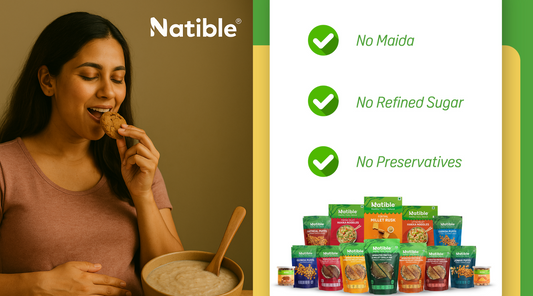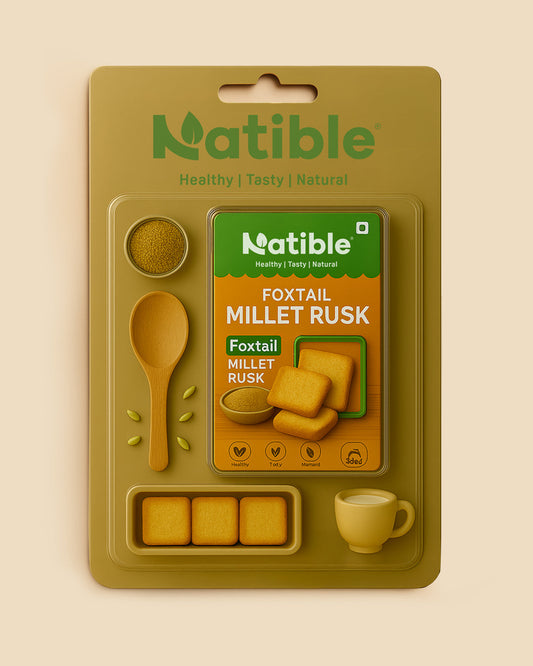In the ever-evolving world of health and nutrition, weight loss remains among the most discussed and debated topics. With countless diets and food trends flooding our feeds, it's easy to get overwhelmed when making the right food choices. Two grains often recommended for their weight loss benefits are millet and oats. But which of the two is truly better for helping you shed those extra kilos?
Let’s dive deeper, beyond the basics, and explore their nutritional value, their impact on satiety and metabolism, and how you can incorporate them into your daily meals, especially through millet-based snacks.
1. Amino Acid Profile & Satiety: The Science of Feeling Full
One of the key factors in weight management is satiety, or how long you stay full after eating. A food that keeps you full for longer reduces the likelihood of unnecessary snacking and overeating.
-
Oats are widely known for their soluble fiber, particularly beta-glucan, which has been shown to increase feelings of fullness and reduce appetite by promoting gut hormone responses (source). This makes oats a go-to option for a satisfying breakfast or midday snack.
-
Millets, on the other hand, bring something unique to the table. Apart from being rich in fiber, they offer a more diverse amino acid profile compared to oats. Millets like foxtail, finger, and pearl millet are rich in essential amino acids such as leucine and methionine, which are critical for muscle maintenance, a vital component of healthy weight loss.
-
Interestingly, a recent study highlighted that millet-based meals lead to a significant reduction in hunger and an increase in satiety, supporting appetite control during calorie-restricted diets.
2. Impact on Metabolic Rate: Fueling Fat Burn Naturally
Your metabolic rate determines how effectively your body burns calories, even at rest. This makes it an important factor in any weight loss journey.
-
Whole grains like oats and millets are naturally rich in complex carbohydrates, which digest more slowly than refined grains. This slow digestion helps stabilize blood sugar levels and prevents energy crashes, encouraging better metabolic balance.
-
A study published in Trends in Food Science & Technology found that millets can improve lipid metabolism and reduce body fat accumulation, suggesting their positive role in preventing obesity and metabolic syndrome (ScienceDirect, 2019).
- Meanwhile, oats have been shown to modestly improve metabolic markers as well, but they lack the broad micronutrient and mineral diversity of millets, especially when it comes to traditional Indian diets.
3. Culinary Versatility: From Daily Meals to Healthy Snacks
When it comes to long-term sustainability, the best diet is one you can stick to—and for that, variety and ease matter.
-
Oats are easy to prepare and often consumed in the form of porridge, overnight oats, or oat-based smoothies. However, they can become monotonous over time.
Millets, in contrast, are incredibly versatile. You can use millet flour to make rotis, -
Millet grains as a rice substitute, or even prepare modern dishes like stir-fries, cutlets, or healthy bowls.
-
And here’s the real game-changer: millet-based snacks. From baked mini cookies to chilla premixes, brands like Natible are reintroducing these ancient grains in snackable, modern formats. These allow you to satisfy mid-meal cravings without compromising your health goals, something oats rarely offer in ready-to-eat options.
Conclusion: Which Grain Wins the Weight Loss Race?
While oats are certainly a valuable grain for weight management, millets go several steps further:
-
Broader amino acid profile
-
Greater impact on appetite regulation
-
Potential metabolic benefits
-
Wider culinary use, especially through millet-based snacks
So, if you’re aiming for sustainable weight loss with added nutritional benefits, millets, particularly when consumed as easy, on-the-go snacks, might just be your best bet.
Ready to make the switch? Explore how millet-based snacks can be your everyday partner in your weight loss journey- nutrient-rich, convenient, and packed with ancient wisdom.









